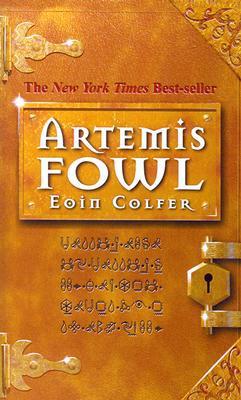Fiction
316 pages
Twelve-year-old Artemis Fowl is a millionaire, a genius—and, above all, a criminal mastermind. But even Artemis doesn't know what he's taken on when he kidnaps a fairy, Captain Holly Short of the LEPrecon Unit. These aren't the fairies of bedtime stories—they're dangerous! Full of unexpected twists and turns, Artemis Fowl is a riveting, magical adventure.
Completion: A
Writing/Style: C+
Characters: C-
Plot/Pacing: C-
World-building/Atmosphere: C+
Sub-genres (Romance, Humor, Mystery, etc.): C-
Final Grade: C+ Library Rental
This novel was a really mixed bag. The whole second half of this book I spent wondering what exactly this book was: middle grade? Young adult? Now, this normally doesn’t bother me. In fact, I cannot think of a single instance where I’ve even really given it much thought.
However,
the writing in this story is such an odd mix of overly high level material
mixed in with pandering, obvious immaturity that I still don’t know what to
think. On one page the narrator would be talking about taxes, the economy,
killing whales for oil, and other content that I just wouldn’t expect from a
young adult book much less a middle grade book, but then on the next page the
narrator would make farts and other bodily functions important to the lore and
the plot. The book really seems like it was written for an older audience, but
then condescendingly added fart jokes to lower it to middle grade.
But let’s back up and start from the beginning.To be frank, I’ve had this book on my shelves for a couple years now, and one thing has kept me time and again from picking it up is this: it is a story about a boy genius. That might sound silly, but it is a personal pet peeve of mine. Whenever I tend to encounter this type of character, most authors commit one or more of these lazy writing sins:
1.) Calls a character a genius and nothing more
2.) Calls a character a genius and only gives that character a big vocabulary to prove it
3.) Calls a character a genius and then dumbs down the other characters to make that character seem smarter
Thankfully, Colfer avoided all of these but instead took his own puzzling route with it. Artemis Fowl is a boy genius that doesn’t act like a boy genius. He is intelligent to be sure, but, except for a couple of moments when he’s thinking/interacting with his mother and a bizarre joke near the beginning where it seems he does not understand that people have sex, there is no sign of him being twelve years old.
Except
for these few times when it is convenient for the plot to remember our main
character’s age, Artemis does not act, behave, or talk like a kid. Which
considering the novel does have fairies, I was willing to give more leeway with
at the start of the book. Who knows, I thought, perhaps the fantasy element
will help explain this? Spoiler: it does not. If this had been a cartoon, again
I would have given it more leeway. In the end, I resigned myself to the
explanation I concocted on my own: he comes from privilege and power and thus
has the resources and luxury to be more educated than others.
Does
this explain everything? Hardly. Artemis acts with the skill and calm of a
villain, with the poise of someone with experience, and with a stoic nature
unfit of a normal child. Nor is it explained why his sidekick Butler does not
rein Artemis in. It is explained that the Butler family has always served the
Fowl family; however, am I to believe that there is no adult Fowl alive and
well that can take care of Artemis and direct Butler?
So, yes, my pet peeve rarely flared up because Artemis so rarely reminded me that he was supposed to be a kid; however, this does come with its own weaknesses. Firstly, Artemis seems to lack a personality other than being a smart anti-hero character. While he sometimes has good lines of dialogue, Artemis for some unexplained reason is emotionally constipated. This lack of emotion really made the character more wooden than he needed to be, making him both hard to relate to and hard to become emotionally invested in. Artemis rarely shows emotion at all except with his mother, which could have led to a better sympathy for both characters and a transformation in Artemis. However, the small payback for this subplot is practically erased in the epilogue.
Of course, this all makes it sound like I hated the book when I really didn’t. I was intrigued by the advanced writing and plot. The side characters were pretty fleshed out and always colorful, even if not all of them were exactly my favorites. As well, the liberties Colfer took with fairy lore reminded me fondly of Rick Riordan’s liberties with Greek mythology in the Percy Jackson series.
I
only wish that Colfer had fleshed out the main characters more, especially
Artemis, had found a more fitting tone, and tweaked the epilogue. Without
giving anything away, the narrator revealed in the epilogue just seems
improbable if not completely lacking.
Once
again, such a shame as I was very interested in finding out who the narrator
was. If Colfer had made these fixes, I would have been that much more invested
in the characters and plot, and I think the book could have become one of my
favorites like Percy Jackson. As it is, I would still say give it a read if you’re
interested, but hopefully you now know just what exactly you are signing
yourself up for. As for me, I think I’m done here. For the first book in a
series, Artemis Fowl was an interesting experiment; however, I think continuing
on would only risk the flaws becoming even more tedious.

